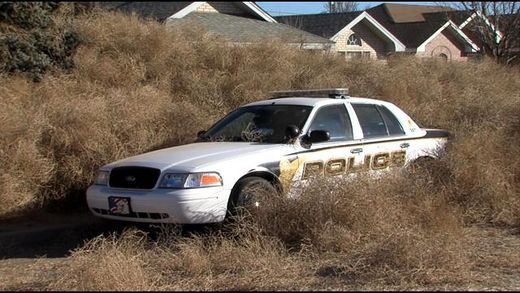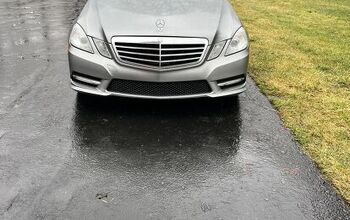New Year's Eve, 1993: The Distributor Plate and the New Mexico Police

Gather a bunch of factory guys together in a bar and you can smell the bullshit flying from a mile away.
In this case, the factory guys were myself and other field sales managers from American Honda Motor Company, and the bar was located inside the Marriott in Torrance, California. The talk turned to working with Honda dealerships.
“I made that dealer take more green del Sols, and I told him to build a new facility and to get his CSI up,” said Ed. “Then I screwed his daughter.”
Haha, sure you did!
Shortly thereafter, the conversation turned to the new California Distributor license plates used by “import” car corporations on company-owned vehicles. The new version did not spell out the word “Distributor” and instead displayed the letters “DST.”
“The next time I get pulled over for speeding and the cop asks what ‘DST’ means,” said Tony, “I’ll say that it’s short for ‘District Attorney’ and I bet he will let me off with a warning.”
Haha, sure you will!
A few months later, I would attempt that very ticket-beating tactic myself.
In late 1993, our once-wonderful world at American Honda was going to hell.
We knew the federal indictments of current and former Honda sales and marketing division executives were imminent and the public would learn the sordid truth about our rumored shenanigans. Those of us not involved in the rampant corruption and fraud had been tainted by the actions of the guilty, and we were all probably on a fast track to the lawnmower division or, God forbid, Acura. I chose to bolt.
By pure coincidence and with perfect timing, I was given an opportunity to work for Honda’s advertising agency at their new regional office in Dallas. I jumped at the chance as I had previously been with Honda in Texas, and I was newly divorced. I tendered my resignation from Honda effective February 1, 1994 and headed to Dallas to buy a home over the Christmas holidays.
It all seems like a whirlwind now: I zipped the 1,400 miles from Los Angeles to Dallas in my company car — a green, 1992 Honda Accord Coupe five-speed manual with a new “DST” license plate plastered to its rear. I spent a week visiting old friends, purchased a house in Valley Ranch, and headed back to California on the morning of New Year’s Eve.
What Steve’s Accord Coupe from that day probably looks like today.
I chose the northern route to go home, angling across the Texas panhandle with plans to pick up the I-40 in Santa Rosa, New Mexico. By mid-afternoon, I was cruising through desolate Clovis, New Mexico. I’m normally a very attentive driver, but I was tired and likely thinking about all my imminent life changes. Worse, I ignored all the warning signs of where and when not to speed: it was a holiday near a one-horse town and there was no traffic in front of me to block radar. Worst of all, I was on a hilly, two-lane highway with limited sight lines.
Coming over a rise at probably 15 mph over the limit, there he was parked on the right shoulder: a Clovis patrol car. A savvy officer, he was only turning on his radar gun when he saw a vehicle rather than being lazy and letting it run continuously. My Escort blared and I frantically downshifted so he would not see my brake lights. I saw him pull out. My right turn signal was on before he even hit his lights.
I pulled to the shoulder and assumed the position: radio off, window down, both hands on the wheel. He was a strapping young guy, probably a former lineman for the local high school football team. And, based on his grumpy demeanor, he was not happy to be working on New Year’s Eve. I figured he was a rookie working his first FNG shift. I could not engage him in any conversation.
Any chance of getting a warning, sir? “Nope.”
He took my license and registration back to his cruiser and wrote me up. He returned to my car and mechanically ran down the standard information about the ticket and how to pay it. And then his attitude suddenly softened and he asked:
“What kind of license plate is that, anyway?”
I have heard of people talking in tongues when under duress, but I never thought it would happen to me. Before I realized the implications, I heard myself saying: “Officer, I really don’t want to say. I don’t want to appear like I am pulling rank on you. You have a job to do and I’m guilty here.”
“What do you mean? Who are you?”
“That’s a District Attorney plate. I am a DA for Los Angeles County.”
He stared at me for what seemed like 30 seconds and then smiled for the first time.
“That’s great you did that! You won’t believe the number of Feds running around this state. When I stop them, the first thing they say is, ‘I’m a cop! I’m a cop!’ like that means they have immunity or something.”
He then proceeded to regale me with stories of pulling over the mayors of neighboring towns. He started to grill me about being a District Attorney. How many DAs do you have? I said 80. (I looked it up later and found the actual number was closer to 900.) I remember we talked about the criminals in the recent Rodney King riots in LA.
I then realized he was still holding my registration showing the Accord belonging to American Honda — not Los Angeles County. I start to envision perjury charges and New Year’s Eve in jail in Bumphuck, New Mexico. I was suddenly scared to death. This was not as much fun as we envisioned back at the Torrance Marriott. I had just lied to an LEO for the first time in my life.
After what seemed like an eternity, he handed me back the paperwork and said he would void my ticket. He thanked me again for being so “upstanding” and told me to “slow it down.”
I start shaking as I pulled away and realized that I needed to get out of New Mexico pronto. What if he is about to get off shift and tells his fellow officers about the LA County DA and they crack up? “Look at the registration, rookie!” What if there was an APB issued for a green Honda, California license plate number DST 3421?
After you get popped for speeding, you typically drive away at the speed limit for about 10 minutes and then say “screw it” and resume your normal speed. I crawled the remaining 375 miles across New Mexico at the speed limit, on high alert for police helicopters and roadblocks.
I was certain the agriculture check station at the New Mexico/Arizona line would have more patrol cars waiting for me than in the final scenes of the “Blues Brothers” movie, but none were to be found. I was home free.
At 11:30 that night, I asked the clerk at the Holiday Inn in Holbrook, Arizona where to celebrate the new year. She directed me to the local American Legion Hall down the street. I literally partied with cowboys and Indians that night, a nice end to a long day.
Six weeks later, as I drove a U-Haul truck to Dallas, I chose the southern route through New Mexico and stuck to the speed limit.
The Texas state line never looked so good.

More by Steve Lynch
Latest Car Reviews
Read moreLatest Product Reviews
Read moreRecent Comments
- Honda1 Unions were needed back in the early days, not needed know. There are plenty of rules and regulations and government agencies that keep companies in line. It's just a money grad and nothing more. Fain is a punk!
- 1995 SC If the necessary number of employees vote to unionize then yes, they should be unionized. That's how it works.
- Sobhuza Trooper That Dave Thomas fella sounds like the kind of twit who is oh-so-quick to tell us how easy and fun the bus is for any and all of your personal transportation needs. The time to get to and from the bus stop is never a concern. The time waiting for the bus is never a concern. The time waiting for a connection (if there is one) is never a concern. The weather is never a concern. Whatever you might be carrying or intend to purchase is never a concern. Nope, Boo Cars! Yeah Buses! Buses rule!Needless to say, these twits don't actual take the damn bus.
- MaintenanceCosts Nobody here seems to acknowledge that there are multiple use cases for cars.Some people spend all their time driving all over the country and need every mile and minute of time savings. ICE cars are better for them right now.Some people only drive locally and fly when they travel. For them, there's probably a range number that works, and they don't really need more. For the uses for which we use our EV, that would be around 150 miles. The other thing about a low range requirement is it can make 120V charging viable. If you don't drive more than an average of about 40 miles/day, you can probably get enough electrons through a wall outlet. We spent over two years charging our Bolt only through 120V, while our house was getting rebuilt, and never had an issue.Those are extremes. There are all sorts of use cases in between, which probably represent the majority of drivers. For some users, what's needed is more range. But I think for most users, what's needed is better charging. Retrofit apartment garages like Tim's with 240V outlets at every spot. Install more L3 chargers in supermarket parking lots and alongside gas stations. Make chargers that work like Tesla Superchargers as ubiquitous as gas stations, and EV charging will not be an issue for most users.
- MaintenanceCosts I don't have an opinion on whether any one plant unionizing is the right answer, but the employees sure need to have the right to organize. Unions or the credible threat of unionization are the only thing, history has proven, that can keep employers honest. Without it, we've seen over and over, the employers have complete power over the workers and feel free to exploit the workers however they see fit. (And don't tell me "oh, the workers can just leave" - in an oligopolistic industry, working conditions quickly converge, and there's not another employer right around the corner.)


































Comments
Join the conversation
I got pulled over 15 or more years ago by a sheriff's deputy in Arizona. I was doing maybe 5-7 over in a bright red press fleet Toyota Celica. He ran the plate and then did a full felony stop. Told me the car was stolen...came back to a 1970s-era Benz. Took me a while to figure out that he'd entered the plate as a standard California license plate with "DST" as the letters followed by whatever the numbers on the plate were. I had to explain distributor's plates to him.
Nice house Steve. Thanks for sharing.